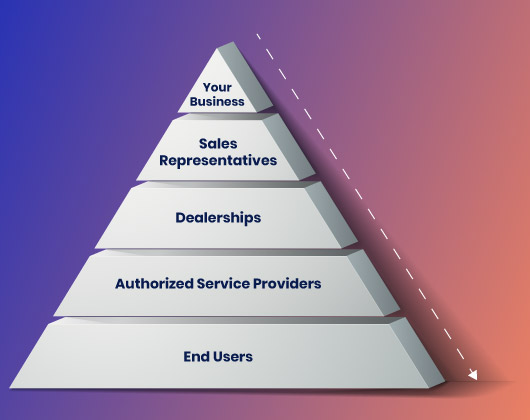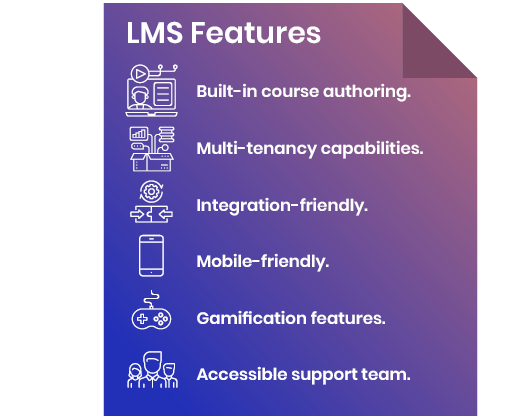In many industries, the days of single storefronts and one cohesive staff are disappearing and partner channels are rising in their place.
These partners enable your business to grow outside the confines of your staff, reaching customers you wouldn’t have been able to prior. However, without proper training, your partners won’t be adequately equipped to help you grow or to benefit from the partnership themselves. We’re going to examine this essential training by answering the following key questions:
- What is channel partner training?
- What is a channel partner LMS?
- What are some channel partner training best practices?
Continue reading for a comprehensive guide to channel partner training, from best practices to the type of software solution that can help you facilitate it all.

What is channel partner training?
Channel partner training, put simply, is the ongoing process of preparing partners to represent your product(s). From marketing to installation certification, partner training ensures your partners have the most up to date product information at their fingertips.
Let’s break this down further, looking at channel partners, their training, and the benefits and challenges we’ve seen.

What are channel partners?
Channel partners are all of the people and organizations involved with selling your product who aren’t employed by your company. These include distributors, re-sellers, wholesalers, installers, and even franchises.
These people connect your business and its products to the end-user— and if your partners aren’t continuously learning about your products, they aren’t representing your company in it’s best light.
To understand channel partners, visualize a classic distribution model.
The cycle begins with your company, which creates a product. This product is then outsourced to sales representatives, who sell it to licensed dealers. These dealers then interact directly with the end-user, placing your product in the hands of the consumer you created it for.
However, the cycle may not end there! If your product requires it, the final step may be a licensed service provider installing the product and providing any follow-up maintenance.

These steps may vary for your organization, whether you work with franchisees, re-sellers, or some other configuration of channel partners. However, one thing is certain: it’s vital that every partner in your channel is on the same page when it comes to their training.

What is channel partner training?
Channel partner training is the process of ensuring each person involved in the sale of your product, from sales representatives to installers, is well-equipped to represent it in the manner that you, the company, intends it to be.
This training provides partners with essential context surrounding the product’s handling, your company’s cohesive messaging, and even general sales, marketing, and maintenance skills. It most often consists of face-to-face and digital learning, from product overview brochures, Q&A discussion boards, and even product video tutorials.
Channel partner training provides partners with everything they need to respond to inquiries, increase sales, and report back to the company they’ve partnered with. Therefore, training is often framed as a prerequisite to becoming a partner.

What are the benefits of providing channel partner training?
Partner training provides a plethora of benefits, for your partners, for your end users and, as a result, your business’s bottom line. Check out a few positive effects resulting from channel partner training:
- Build and protect your company’s brand. Multiple partners means multiple people guiding the narrative surrounding your product. Channel partner training means your cohesive brand is maintained across all of its storytellers.
- Improve partner performance. Certified partners are equipped with the best-possible messaging to get your product into the end-user’s hands and encourage full adoption. By adding new training materials often, your products stay top of mind.
- Reduce support costs. When you train a partner correctly from the start of your engagement, you don’t have to continuously re-train them when things go wrong. They’ll have the knowledge to prevent problems and solve them when they arise.
- Increase customer retention. Improved partner performance also means increased partner responsiveness to customer concerns. This responsiveness leads to increased customer retention rates.
- Clearly manage expectations. When expectations are clearly communicated, on both yours and the partner’s ends, there’s little room for surprise if expectations aren’t met and changes need to be made.
- Experience faster growth. With a clear channel partner training strategy on hand, you’re always ready to train the next partner to join your company. No more waiting to get new partners up to speed!
- Create a new revenue stream. By selling courses to partners, your company gains a new source of revenue.
The benefits of channel partner training are undeniable. However, if administered poorly, issues can arise.

What are some common channel partner training challenges?
Even though the necessity of partner training is clear, issues can arise when a company’s program is lacking in one or more ways.
There are a few specific challenges that can arise due to poorly administered channel training:
- Loss of training quality: As a corporation grows and creates more and more partnerships, contact with each individual partner decreases. As this contact decreases through the channel, both necessary information and motivation can be lost.
- Pervasive outsider attitudes: Because channel partners aren’t employees of a company, they can easily feel excluded from the company’s culture. This can lead to a lack of loyalty and motivation.
- Competitors diluting the partner’s attention: A partner is likely interacting with a plethora of different companies and products. This can dilute the time and effort they spend with any one partner company.
The risk of these issues is leading many companies to a digital-first training solution— a channel partner learning management system (LMS). Continue reading to learn all about channel partner LMSs and how they can benefit your company’s partner management.

What is a channel partner LMS?
A channel partner LMS is a type of software that can facilitate all of the training that partners need to become experts on your product.
This software is particularly useful in manufacturing industries, which often involve a vast network of intermediaries between the company and the end-user, and large corporations that are often spread across the country, and maybe even the world.
In situations like this, it can be difficult to monitor the training of each and every partner your company works with. A channel partner LMS removes much of that uncertainty.
By standardizing the education your partners receive, facilitating continuing conversations between partners and your company, and even outsourcing some of the training tasks to appropriate administrators, an LMS can have a direct positive influence on your company’s growth.

What should you look for in a channel partner LMS?

There are quite a few LMS options on the market, and it’s imperative that you choose the right solution for your partners’ needs. The right channel partner LMS can have a transformative impact on partners’ expertise, and consequently, the success of your business.
There are a few essential features to look for when choosing your channel partner training solution:
Built-in course authoring.
You want to spend more time working with your partners than you do creating the education you provide those partners. An LMS with built-in course authoring functionality allows you to develop the needed curriculum and distribute it with ease.
A document and marketing collateral library.
Your partners are regularly discussing your product with end-users. Ensure up-to-date marketing and documentation practices are maintained across your partner network with one streamlined content distribution system.
Sub-portal and multi-tenancy capabilities.
Not only do each of your partners need their own training portal but also the various levels of channels you deploy. Many corporations have multiple levels to their channel partnerships, from the base company to dealers to the salespeople working under the dealers. Multi-tenancy options allow administrators to provide education for and track specific metrics around each particular subset of your partners.
Integration-friendliness.
An LMS that offers extensive integrations ensures that all of your software solutions are able to communicate with ease.
First and foremost, you want a solution that integrates with your CRM. However, some LMS systems also integrate with CMSs, popular messaging apps, survey providers, and even secure document providers.
Mobile-friendliness.
Installers and sales representatives may be, at times, working in the field rather than from an office. Choose an LMS that provides a seamless, easily-accessed experience from any device, whether desktop or mobile, so every partner can access the needed educational materials.
Gamification features.
Completing a course related to one’s job can at times be a less-than-engaging experience. However, it’s vital that partners maintain continued attention throughout their training so they can truly become experts in your product.
The most effective way to maintain this attention is through gamification elements such as leaderboards, badges, flashcards, memory games, and even self-assessments. The healthy competition gives partners something to aspire to— even if they’re not feeling engaged by the particular topic in question.
Accessible support team.
Adding new technology to your channel partner management practices can be an involved task, and you want to work with an LMS provider that offers support through the entire process. This includes a pre-implementation meeting to examine your current process and create a road map for improvement, as well as continuing support post go-live.

Channel partner training strategy best practices
Channel partner training is an investment, and you don’t want to rush into creating a program and end up with a solution that doesn’t serve you well. There are a few best practices that ensure you create the best training strategy for your business’s needs.


Be mindful of the budget you have to expend on training.
Though you need to ensure partners are adequately trained, you also need to be mindful of your company’s financial capacity to do so. Before you begin exploring channel partner training solutions, determine how much money you have to spend on the process.
The price of providing channel partner training can range dramatically depending on a few different factors.
For example, if you’re looking to hire an instructor to star in your partner training videos, or outsource the graphic design of all of your courses, you might be looking at a more expensive training solution. On the other hand, you might be able to find a more affordable option that involves more internal work for your company.

Understand the type of content your channel partners need.
There isn’t a one-size-fits-all solution for channel partner training. The needed education can vary across industries, across companies, and even from partner to partner within one channel!
Just as channel partners working with a software company need different training than partners working with a clothing company, sales representatives require different training than installers and service providers.
When building your channel partner training strategy, start with examining the skills your particular channel partners need to succeed. This training can generally be organized into two categories:
General Skills Training
General skills training can be somewhat universal across industries.
For example, sales best practices will be the same whether you’re working with software or a physical product. Other common business considerations, from customer communications to basic safety protocols, fall under this category as well.
This type of training is generally less specific, and at times, there are even vendor-neutral options for you to outsource to. Make sure you review the quality of the training if you do outsource and the relevancy for your partners.
Product Training
Product training is exactly as it sounds. Channel partners need to understand everything there is to know about your specific product and its service. From basic features to advanced problem-solving, your channel partners need to have quick answers on hand when working with customers.
When creating your channel partner training strategy, dedicate a considerable amount of time to the product-specific courses you’re providing. This is the training that often ends with a channel partner being certified to sell/support your products, so you want to make sure you provide the tools they need to be successful.

Align your channel partner training with your company’s KPIs.
Make sure your channel partner training is in line with your company’s key performance indicators (KPI). These metrics track how your business is measuring up in regards to your overall goals for the year, and it’s important that partners are aware of these goals.
Channel partners can become out of touch with your KPIs due to outdated education, or even just lack of regular exposure to them. How are partners supposed to help your business reach its goals if they’re unaware of them?
When creating your training courses, make sure you’re creating them in a way that is building toward your company’s overall goals. Further, explicitly state these goals within the course, so partners are aware. If you’re wanting to decrease service response times, increase customer retention, or even gain a certain number of new customers— tell your partners!

Choose the right platform for you.
There are many different options for channel partner training on the market right now, and not every solution will be the right fit for your company.
For example, a small company with just a few partners might benefit from an in-person, hands-on experience. However, a large corporation with worldwide partners would find that kind of one-on-one solution to be nearly impossible to sustain!
At that point, employing an LMS would be the way to go. But, the answer isn’t that simple since there are a ton of options to choose from. Channel partner training is an immediate (and ongoing) investment in your business’s growth, so you want to choose your training solution carefully.
Our recommendation? PartnerAmp’s Channel Partner LMS.
PartnerAmp’s Channel Partner LMS offers every feature mentioned in this piece and more. The solution is data-driven, so you can both understand your learners and set goals for each partner in your system, ensuring you get the highest ROI possible.
Further, it was created to be easily administered, whether you’re working with a few partners or managing a multi-portal solution. The software was created to drive your business’s growth, on both the partner-facing and administrative ends!
Channel partner training increases the success of your business’s partners, improves your relationships with those representatives, and supercharges the growth of your business at the same time.
This training can be valuable for businesses of any size, in any industry, and therefore should be handled with care. For more information about channel partner training, and the LMS platforms that administer this training, check out the following additional resources:
- 3 Strategies to Motivate Sales from Channel Partners. Channel partners aren’t employees, so traditional methods of motivating won’t work. Learn how to monitor and encourage channel partners with this article.
- Using Technology to Manage Your Sales Channels: The Tech Stack. Looking for more information regarding partner management technologies? Check out this article.
- Keeping Tabs on Sales Leads with Channel Partners. When you’re working with channel partners, you often lose that direct contact with interested buyers. Learn about keeping track of sales leads when working with channel partners (using an LMS-integration-friendly CMS) here.



